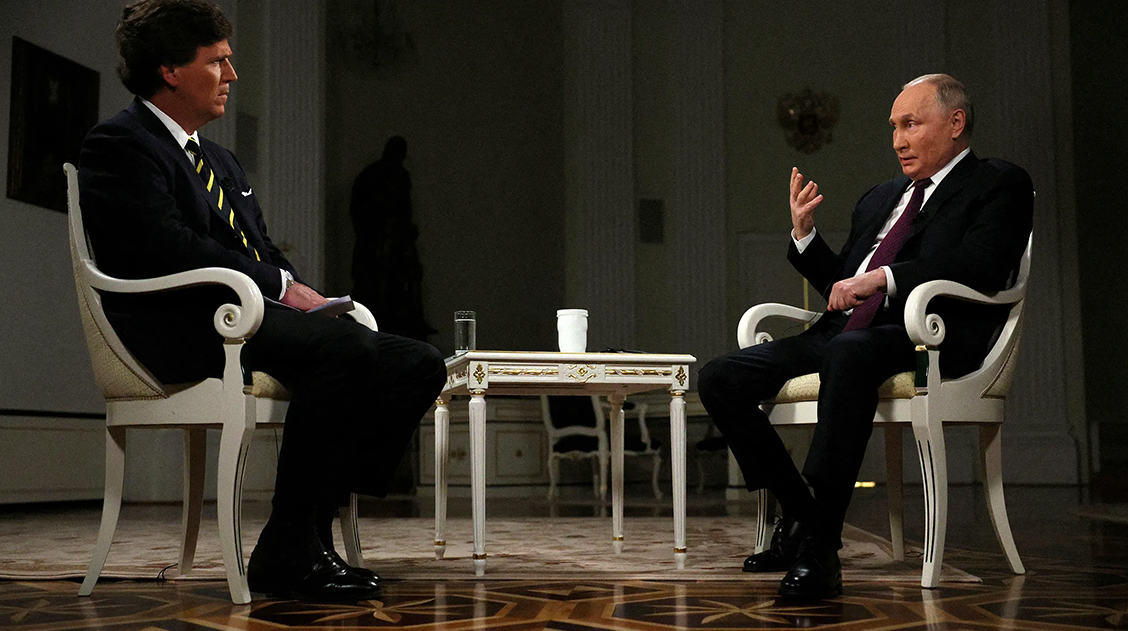
Putin is having a good month. On 6 February, popular American talk show host Tucker Carlson made him sound wise and reasonable in a widely broadcast interview, then on 17 February the Ukrainian town of Avdiivka fell to the Russians. On 16 February Putin’s greatest domestic opponent, Alexei Navalny abruptly died – or was killed? – in prison.
After 24 years at the helm, Putin has not lost his appetite for power. Last week he announced he will run for elections again. With Navalny and Prigozhin dead, who else will step up to challenge his credibility? The guaranteed election win for Putin will give him the presidency til 2030 … unless he loses the war with Ukraine. While the US remains divided about opposing Putin, he stands every chance of winning.

Others are taking note of the rising stakes— last week at the Munich Security Conference (16-18 February) Republican senator JD Vance warned Europe, “there is clearly not an appetite for more blank checks for Ukraine,” later posting on X, “If Putin is such an existential threat to Europe why isn’t every European country emptying it armouries and its treasury to help Ukraine?
Without America’s unconditional backing, Europe feels alone. European sanctions were meant to pressure Putin to stop the war, but they seem to have boomeranged and hurt Europe as much as Russia.
Putin, for his own survival, cannot lose this war and it’s clear that he is throwing everything at it. Russia is spending one third of its national budget on defence; according to Bastian Giegerich (Director General of the International Institute for Strategic Studies), Russia can sustain its war effort for only “two to three more years.”

Europe needs to outspend Putin and put the result of the war beyond doubt. Last week Ursula von der Leyen (President of the European Commission) told the FT that the EU must subsidise defence production for a rougher world. Losing to Putin is surely an unthinkable catastrophe for NATO.
But Europe is stretched thin. How does it fund a war against Russia while competing against Chinese manufacturing and American technology, given its higher energy and labour costs? How does it survive in this “rougher world.”?

Energy:
Europe’s first priority should be to radically reduce energy costs and get them as close as possible to the US, which are half the price of Europe. At present the best way to do this is with rooftop solar and simple battery storage systems for powering their homes free during peak tariff times. South Africa’s installed rooftop solar PV capacity increased from 983MW in March 2022 to 4,412MW in June 2023, a whopping 349% increase in little over a year.
Nuclear and wind are also important for adding clean energy to the grid, but they cannot scale nearly as quickly and cheaply as rooftop solar.
Investment:
According to McKinsey the average life-span of companies listed in Standard & Poor’s 500 was 61 years in 1958. Today, it is less than 18 years; by 2027, three quarters of the companies on the S&P 500 will have disappeared. In the age of creative destruction, no country can afford to subsidise dying businesses. Their only hope is to attract new entrepreneurs and capital to build tomorrow’s winners.
If you read the FT, you get the impression that America is where you should make your money and Europe is where you should spend it. Europe needs to flip this script and attract investors. At Autonomy we work with the agencies that promote Greater Paris, London and Berlin. Their mandate is to promote investment to their regions and assist foreign investors. (Choose Paris Region helped me open a business bank account in Paris after the bank manager initially refused because he claimed I could be laundering drug money.) But these agencies have small budgets and generally compete against each other.feared I would use it to launder drug money. But these agencies have small budgets and generally compete against each other. Europe needs a fast-track policy for entrepreneurs wanting to build job creating businesses that can serve a global audience.

Friends, Frenemies and Enemies
Russia, once a frenemy, is now an enemy. America, once a friend, is now a frenemy; with Biden’s Inflation Reduction Act attracting European companies, American Big Tech continuing to extract record profits without paying much tax, and the Republican party telling Europe they’re on their own. China was a friend when its factories helped European brands make cheap products and the Chinese were the biggest buyers of European luxury. Now that China is building its own brands and exporting them to Europe it’s fast moving across to frenemy status, and possibly enemy. Europe needs to convince China not to supply Russia with weapons; they will have more sway if they carry on trading with China. China has betted the farm on green tech hardware and if the US and EU block its exports it will feel it has nothing to lose. Obviously, Europe does not share the same democratic values with China and has to protect some key industries like the auto industry; but using China solar and battery tech to decarbonise and reduce energy costs quickly would be a smart move.